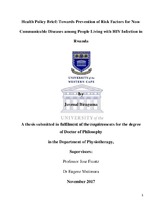Health policy brief: Towards prevention of risk factors for non-communicable diseases among people living with HIV infection in Rwanda
Abstract
People living with the HIV infection (PLWHI) can now live longer due to the
availability and effective use of combination antiretroviral therapy (cART). Eastern and Southern
Africa remains the region affected by HIV. Rwanda is one the Eastern Africa that has achieved
high rates of antiretroviral therapy (ART) coverage, accounting 164,262 (78%) of all PLWHI in
2016. However, both HIV infection and continued use of life-long cART medications have been
associated with a constellation of non-communicable diseases (NCDs). Additionally, HIVinfected
(HIV+) persons are at increased risk of NCDs, especially cardiometabolic diseases
(CMD), compared to HIV-uninfected (HIV-) counterparts. People living with HIV infection are
at an increased risk for NCDs due to their HIV status and their resultant reduced immunity, the
use of some cART, and contextual and sociodemographic factors. Fortunately, lifestyle factors
including regular physical activity participation, diet modification, and smoking cessation could
play a major role in preventing CMD, and in improving life expectancy for HIV+ individuals.
However, these interventions are not always integrated in routine African clinical settings,
particularly in Rwanda. Currently, health-related benefits of people living with HIV infection on
established ART, has shifted from survival to a health-related quality of life outcome (HRQOL).

